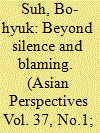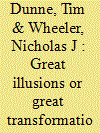| Srl | Item |
| 1 |
ID:
118416


|
|
|
|
|
| Publication |
2013.
|
| Summary/Abstract |
Despite over a decade of collective efforts on the part of the international community, the North Korean human rights issue remains prevalent and pervasive. I propose "Korean human rights" as an alternative concept and approach for South Korea to constructively contribute to improving the human rights situation in North Korea. The notion of Korean human rights can be used as a method to overcome the limitations that both South Korea and the international community have faced in the past and a framework for effectively applying international human rights conventions at the regional level.
|
|
|
|
|
|
|
|
|
|
|
|
|
|
|
|
| 2 |
ID:
167208


|
|
|
|
|
| Summary/Abstract |
Human rights have been in the practice of international relations, but they have not been central to academic thinking on International Relations (IR) for most of the century since the discipline became institutionalized in 1919. We suggest two related reasons for this relative neglect by the IR community. First, the US heartland of IR prioritized other institutions of international order during the 1950s and 1960s, primarily the balance of power, diplomacy, and arms control. Second, human rights were treated with suspicion by realists in particular given their view that morality in foreign policy was potentially disruptive of international order. If the emergent discipline of IR largely ignored the 1948 Universal Declaration of Human Rights, so did the rest of the world according to the revisionist history of human rights offered by Samuel Moyn. He challenges the idea that the birth of the regime was the culmination of a 150-year struggle that began in the minds of Enlightenment thinkers and ended with a new globalized framework of rights for all. While IR was slow to come to human rights, the pace in the last three decades has quickened considerably; the area of protecting the basic right of security from violence being a case in point, where several IR scholars have been pivotal in the development of action-guiding theory. Developing a critical theme in Carr’s The Twenty Years’ Crisis 1919-1939, we consider whether these institutional developments represent great illusions or great transformations in international relations in Carr’s terms.
|
|
|
|
|
|
|
|
|
|
|
|
|
|
|
|
| 3 |
ID:
111524


|
|
|